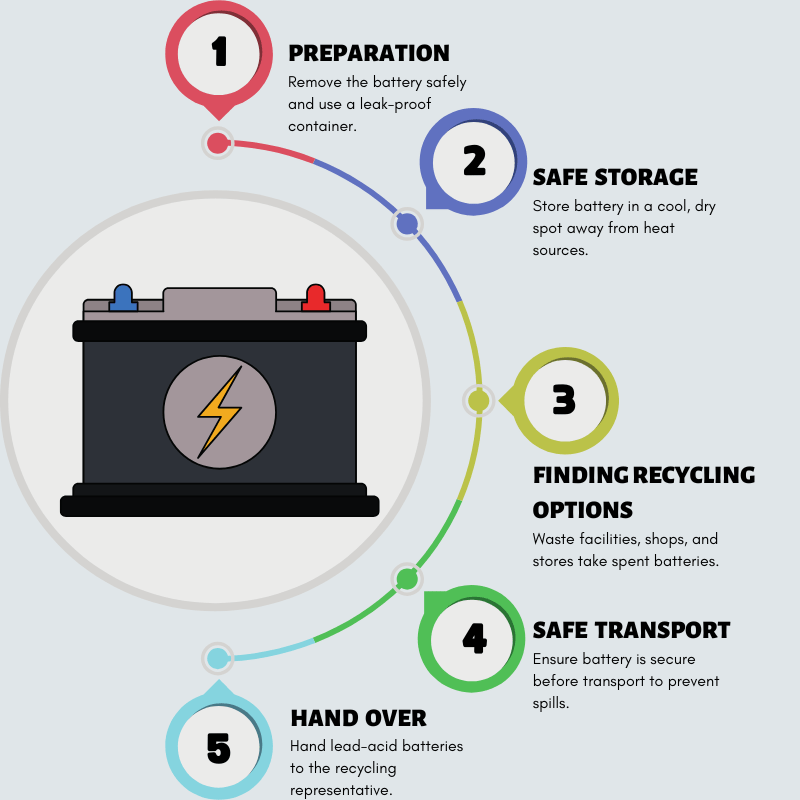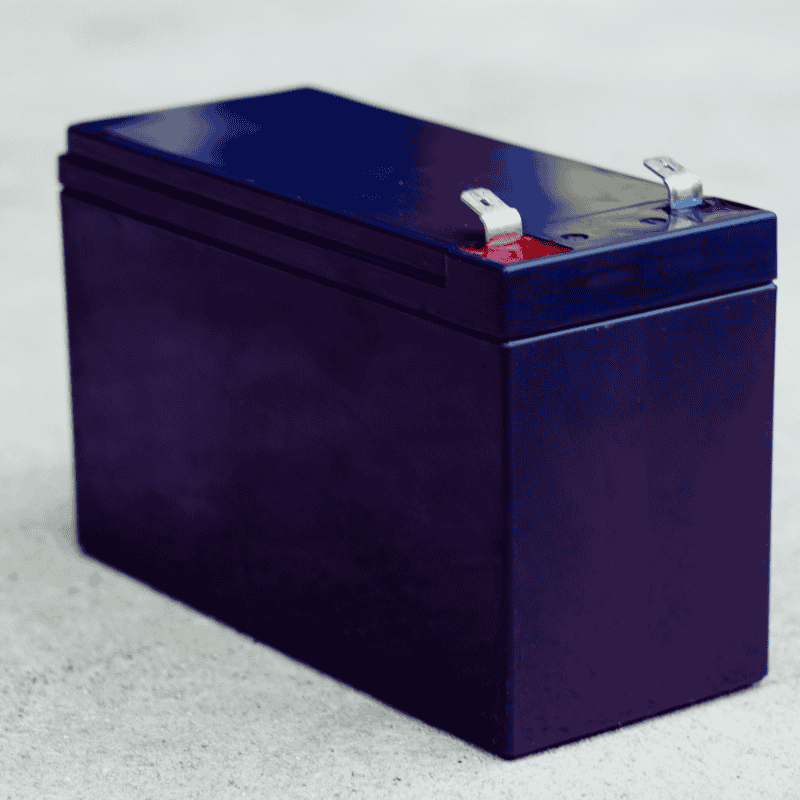Lead-acid battery recycling is critical for both the environment and public health. These batteries power cars, backup systems, and heavy machinery—but when they die, they become hazardous waste. Improper lead-acid battery disposal can release toxic lead and sulfuric acid into the soil and water.
So, are lead-acid batteries recyclable? Thankfully, yes! Lead batteries undergo an extensive recycling process, making them the most recycled consumer product in the U.S. Recycling them responsibly isn’t just about clearing out clutter; it’s crucial for protecting our environment and safely managing materials that could otherwise leach into landfills and water sources.
Key Takeaway: How To Recycle Lead-Acid Batteries
Lead-acid batteries are fully recyclable but must be handled as hazardous waste. Always store them upright in leak-proof containers, avoid trash disposal, and take them to certified recyclers like auto shops, HHW sites, or battery retailers. For fast results, use GreenCitizen’s Green Directory to find lead-acid battery disposal near you.
Note: GreenCitizen cannot currently accept any loose batteries not installed in electronics due to hazards associated with handling and storage.
Where to Recycle Lead-Acid Batteries
When it’s time to recycle a lead-acid battery, several options are available. Start by checking local recycling centers or household hazardous waste (HHW) facilities—many cities have drop-off sites specifically designed to handle toxic materials like battery acid and lead oxide safely.
Automotive shops and retailers, such as Home Depot, also accept lead-acid batteries for recycling. They work with battery manufacturers and certified recycling facilities to ensure that materials are processed responsibly.
At these facilities, the recycling process includes removing and neutralizing harmful sulfuric acid and extracting valuable components like lead oxide and plastic for reuse. This battery recycling not only prevents hazardous waste from contaminating the environment but also supports the recovery of materials that can go into new batteries.
Before visiting, check each facility’s guidelines to ensure safe and compliant disposal.
✅ Tip: Search for “lead-acid battery disposal near me” or use GreenCitizen’s Green Directory to find certified locations close to you. Always call ahead to confirm drop-off requirements.
How to Recycle Lead-Acid Batteries Safely: A Step-by-Step Guide

Recycling used lead-acid batteries isn’t as simple as tossing them into a bin. These batteries contain toxic lead and sulfuric acid, and improper handling can cause environmental contamination or health risks.
Here’s a safe, legal, and effective way to recycle lead-acid batteries from start to finish:
1. Preparation
Begin by safely removing the battery from any device or vehicle. Place it in a non-reactive, leak-proof container, as lead-acid batteries contain sulfuric acid that can corrode materials. Avoid using metal containers, which can react with battery acid. If possible, place the battery in a plastic case designed to hold hazardous materials to minimize the risk of leaks or spills. Make sure the battery case is intact to prevent any dangerous leaks.
2. Safe Storage
While you’re waiting to recycle, store the battery in a cool, dry place away from direct sunlight, flammable items, or heat sources. Storing batteries incorrectly can increase the risk of short circuits or leaks. Keep the battery upright and away from other metal objects to reduce the chance of accidental sparking or reactions with the battery acid.
3. Finding Recycling Options
Once you’re ready to recycle, search for approved recycling centers or collection points that accept lead-acid batteries. Local hazardous waste facilities, automotive shops, and some retail stores, such as hardware and automotive supply stores, often accept spent batteries for safe disposal. For a convenient option, consider looking up locations that offer recycling pickup services or certified e-waste centers.
In this case, you can use our Green Directory. This will help you locate all the local recycling centers that can take away lead-acid batteries and safely dispose of them.
4. Safe Transport
Transporting lead-acid batteries requires extra caution. Before heading out, double-check that the battery is securely contained to prevent spills. If you have multiple batteries, separate them in individual containers or use a sturdy cardboard divider to keep them from touching each other. Wear gloves when handling the battery, as this will protect you from any residual acid that may be present. Always place the battery upright during transport and avoid any sharp turns or impacts that could cause it to shift or leak.
Following these steps ensures that recycling lead-acid batteries is a safe and efficient process, reducing the environmental impact and allowing valuable materials to be recovered and reused responsibly.
Are Sealed Lead-Acid Batteries Recyclable? What You Need to Know

Sealed lead-acid (SLA) batteries differ from regular lead-acid batteries because they are sealed, making them spill-proof and more secure for specific uses, like automotive batteries and backup power sources. However, recycling SLA batteries requires special handling due to their enclosed structure.
Inside these batteries, components such as lead plates, lead oxide, and sulfuric acid must be carefully managed to prevent contamination. Rechargeable batteries, like SLA batteries, play a crucial role in powering essential components and have a high recycling rate.
To recycle sealed lead-acid batteries, locate facilities that specialize in recycling sealed lead acid batteries. These centers have the tools to safely extract materials like purified lead and neutralize battery acid. Most automotive shops, battery suppliers, and hazardous waste facilities accept SLA batteries, and they follow strict guidelines to process them without breaking the seal, preventing hazardous leaks.

Read More:
Common Mistakes to Avoid When Recycling Lead-Acid Batteries
When it comes to lead-acid batteries disposal, avoid these common mistakes:
- Throwing broken battery pieces in regular trash: This can release hazardous materials that harm the environment.
- Using reactive containers: Always store batteries in a non-reactive container to prevent leaks or dangerous reactions.
- Ignoring state laws on hazardous waste: Non-compliance can lead to fines and further environmental damage.
- Improper storage and handling: Proper battery recycling requires careful storage and transport to prevent spills and contamination.
Easily Find Recycling Locations Near You
Ready to take action with your lead-acid battery recycling? With GreenCitizen’s Green Directory, finding a local recycling center is quick and easy. Just search your location, and you’ll find approved facilities that safely handle battery materials like lead and battery acid, keeping these hazards out of landfills.
Every battery you recycle keeps harmful waste from contaminating our environment and contributes valuable materials to make new batteries. Start making an impact today—find your nearest recycling point and keep your old batteries out of the trash!
